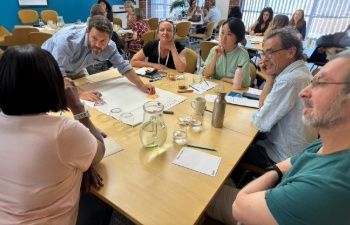Business School aligns efforts for fairer food systems in Brighton and Hove
By: Chimezie Anajama
Last updated: Wednesday, 3 September 2025

Over 6,000 people in Brighton and Hove rely on weekly food support. To help tackle this and other pressing food-related issues, the University of Sussex Business School brought people from across the University and the city into a room on Wednesday, 18 June 2025, to identify clear-cut actions to take together.
The event, led by Professor Adrian Ely and Dr Katerina Psarikidou, and sponsored by the UKRI-funded FoodSEqual project, focused on the city’s new Food Strategy and Action Plan (2025–2030), which Sussex research helped to inform at another event last year. It sought to find out how the University’s various food initiatives — from campus catering to sustainability research — could align with the Strategy to help address rising food inequality and insecurity.
Food practitioners, local businesses, students and academics, including Professor Robin Banerjee, Pro-Vice-Chancellor, Global and Civic Engagement, University of Sussex, attended the event alongside Ali Ghanimi, Senior Manager, Brighton & Hove Food Partnership. Other participants included members of the Black and Minority Ethnic Community Partnership as well as stakeholders from Brighton & Hove City Council. Banerjee, in his welcome remarks, highlighted how the work benefits society, reinforcing the University’s commitment to social good.
On launching the Food Strategy, Ghanimi highlighted some of the city’s planned actions for improving food systems, including prompting major city caterers to adopt sustainable food practices.
Watch Ali Ghanimi on the University’s role in the city’s food strategy
An interdisciplinary panel discussion and audience break-out session then considered practical ways of aligning the Strategy with the University’s food initiatives. Sandra Juan Delgado, Sustainability Manager at Chartwells, the University’s caterer, highlighted the success of the “Sussex Saver” that offers £2 healthy meals on campus. Dr John Thompson, Deputy Director, Sussex Sustainability Research Programme (SSRP), emphasised the need to strengthen links with local food producers and shared SSRP’s plan for regional research hubs. Dr Katerina Psarikidou, the policy lead of the FoodSEqual project, emphasised the power of community-led research. PhD student Viola King Forbes advocated for deeper student engagement in food initiatives, and Adam Batchelor from the Sustainability Team recommended looking into tested strategies, like London’s “School Superzones”, which limit fast food outlets near schools. Angela Blair (Brighton and Hove City Council) contributed to discussions on city-level food policy.
Reflecting on the event and the Strategy, Ely noted: “The University has an important part to play, not only through research and teaching, but also through the food decisions we make every day as consumers and as citizens of Brighton and Hove.”
By fostering collaboration among stakeholders, the Business School continues to drive real-world change for a sustainable food system.
Watch Professor Adrian Ely on the University’s local collaborations for a fairer food future.